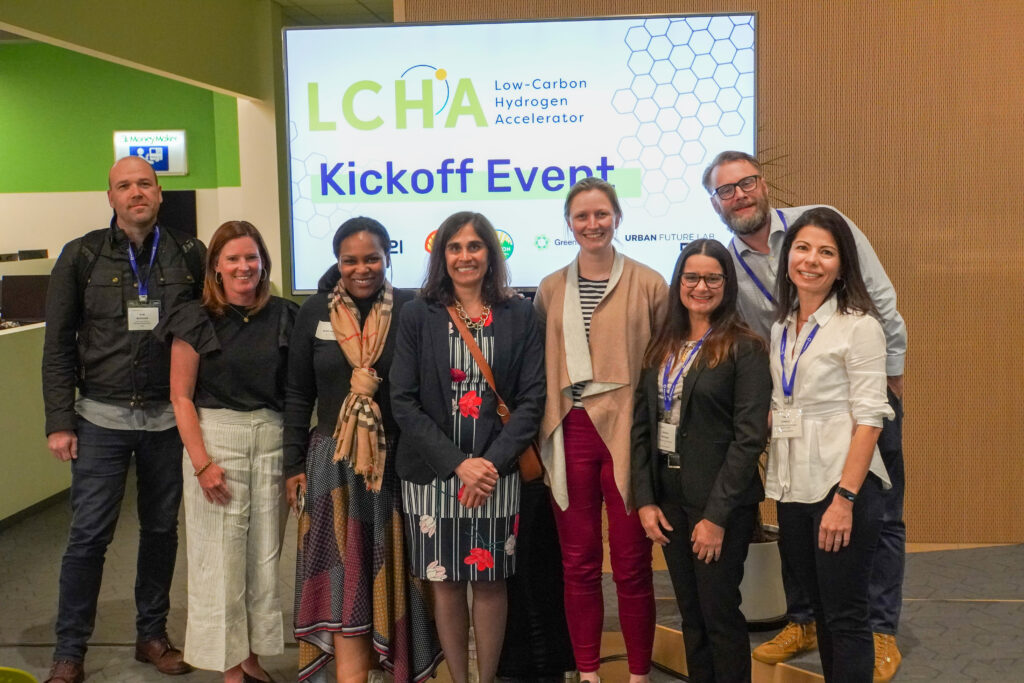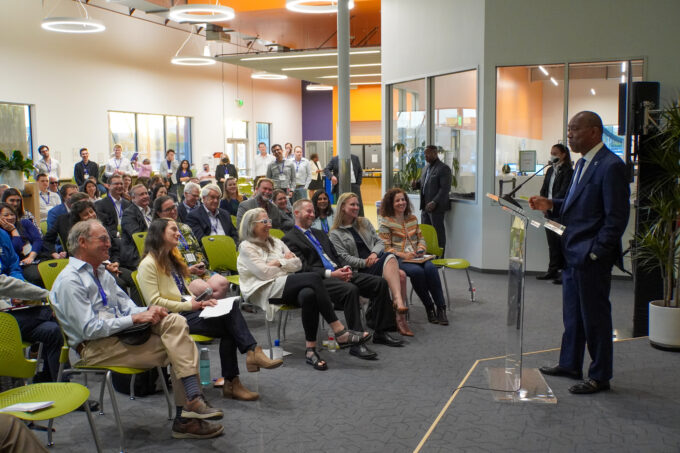With the announcement of the Department of Energy’s Regional Clean Hydrogen Hubs program, new tax credit opportunities under the Inflation Reduction Act, and global investment tailwinds, low-carbon hydrogen is on a trajectory to potentially become a significant component of a low-carbon future.
Hydrogen can act as both a carrier for electricity and a fuel, meaning it can be used for a broad range of applications, including in hard-to-decarbonize sectors. As more intermittent renewable energy comes onto the grid, hydrogen can also act as an electricity-storage medium, allowing grids to maximize wind, solar, and other low-carbon energy sources. Most importantly, hydrogen can dramatically reduce the carbon intensity of our energy systems when generated via low-carbon methods.
This versatile technology was at the heart of Go Energize 2022: The Low-Carbon Hydrogen Accelerator. This Greentown Go startup-corporate partnership accelerator program—run with the EPRI, Shell, the City of Houston, and the Urban Future Lab at the NYU Tandon School of Engineering—focused on accelerating the startups’ paths to commercialization.
After a global search that saw nearly one hundred applicants, the program partners selected a cohort of seven cutting-edge startups for the six-month accelerator. With solutions including advanced electrolysis, membrane innovations, storage solutions, novel hydrogen fuel cells, digital twin modeling and pipeline retrofit and monitoring solutions, the cohort included unique technology for nearly every step in the low-carbon hydrogen value chain. Working with Shell and EPRI, the startups pursued partnerships to unlock the next steps in their commercialization.
- Advanced Ionics (Milwaukee, WI): In addition to refining its investor- and customer-facing value proposition, Advanced Ionics was able to conduct market discovery exercises and establish connections for additional grant funding—allowing the team to explore feasibility study options for scaling its electrolyzer technology and deepen conversations with program partners regarding potential investment.
- Arco Technologies (Bologna, Italy): Arco Technologies leveraged its LCHA participation to expand to the U.S. and hired a new CEO through a connection formed via the program. To build on its momentum, Arco are exploring future collaboration options with Shell to further develop its membrane electrolyzer, while EPRI will stay involved with the startup to offer additional guidance.
- Clean Power (Greater Manchester, United Kingdom): Through LCHA, Clean Power toured Shell’s demonstration microgrid at its Houston facility alongside representatives from EPRI. The visit allowed the Clean Power team to better understand the specifications needed for its polymer electrolyte membrane (PEM) fuel cell. In addition, the team learned more about customer specifications and evaluated various potential applications for its tech, looking specifically at technical suitability and market potential.
- Element Resources (Houston, TX): With the guidance of Shell and EPRI, Element Resources participated in extensive market discovery for its compressed hydrogen storage solution. As a next step toward commercialization, the startup will be included in a benchmarking study that Shell is conducting of mid-volume (‘000’s kg) hydrogen storage technologies.
- RUNWITHIT Synthetics (Alberta, Canada): The team from RUNWITHIT Synthetics scoped a proof-of-concept project with Shell—the first time RUNWITHIT’s digital twin modeling technology has been used for a hydrogen-grid application—with the goal of better understanding and assessing hydrogen grid carbon intensity, transportation methods, and resilience in the case of extreme weather events. RUNWITHIT’s current Hydrogen Twin platform is being used by hubs for workforce and project phasing design. RUNWITHIT also has multiple projects underway with EPRI.
- Smartpipe Technologies (Houston, TX): During LCHA, Smartpipe Technologies explored the potential integration of its self-monitoring hydrogen pipeline solutions into existing equipment and infrastructure. With EPRI, Smartpipe reviewed design, materials, and test procedures. With Shell, the startup is continuing technical diligence and acceptance testing, allowing its tech to be potentially utilized in future Shell projects. In addition, it identified both materials and lab space to be used for future validation testing.
- SPEC Sensors (Newark, CA): SPEC Sensors has now partnered with Shell to co-apply for federal grant funding from the Department of Energy. The goal of this continued collaboration is to conduct a validation project at the National Renewable Energy Laboratory for SPEC Sensors’ hydrogen-leak-detection and line-monitoring sensor systems.

The Go Energize 2022 collaboration and progress took place with the City of Houston as the program’s backdrop. With abundant renewable energy resources, relevant infrastructure, industrial demand, and skilled energy industry workers, Houston is poised to become a world leader in low-carbon hydrogen. Through membership at Greentown’s Houston incubator, LCHA participants gained access to a significant network of local resources to help expedite the development of their tech and Houston’s transition toward a low-carbon future. With the continued dedication of innovative startups, energy incumbents, and visionary municipalities, low-carbon hydrogen could become an important component of a decarbonized economy.
Stay tuned for news and updates about future low-carbon hydrogen programs! To learn more about other Greentown Go programs—such as Go Energize 2023 with Vineyard Wind and the Massachusetts Clean Energy Center, our current program dedicated to decarbonizing the energy industry through responsible offshore wind development—sign up for our Greentown Go newsletter.


